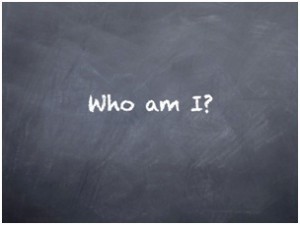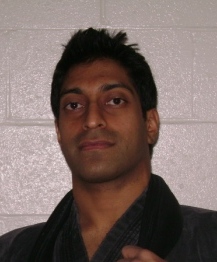is with yourself.
 It comes down to self-identity, how you define that identity and why you are emotionally attached to that identity. It is composed of how we assess ourselves (and how we think how others assess us) on a variety of attributes, some more tangible than others: our job, our education, our hobbies, our skills and abilities, our physical appearance, our relationships, our past experiences and our future expectations.
It comes down to self-identity, how you define that identity and why you are emotionally attached to that identity. It is composed of how we assess ourselves (and how we think how others assess us) on a variety of attributes, some more tangible than others: our job, our education, our hobbies, our skills and abilities, our physical appearance, our relationships, our past experiences and our future expectations.
Now, take moment and think about those elements, and any more that you can think of, and describe for yourself what constitutes your self-identity. Write it down. Do this first before reading further.
Why is that important? Because, there may be some permanence in the language you used to describe your self-identity. And, that may be holding you back...holding you back from the progress or change in your life that you seek.
You see, the language we use, how we talk, how we write things down, how we communicate can be limiting in itself. For example, in the description of your self-identity you may have made a statement like this "I am _______".
For me, it could be as simple as "I am a martial artist".
Without getting into a lengthy debate on how a martial artist is defined, do you see that inherent permanence in that statement? This is what I am period. But really, I am defining my self as a martial artist because of the things I have done in the past, my daily activities and the expectations of my future activities.
Our self-identity is not a statue, it is a process, a continuum. If I ceased to practice and teach martial arts, could I continue to describe myself as a martial artist? Perhaps not. But, I've decided there is some value to that statement, I have an emotional attachment to being that thing, so I continue to take the actions that keep that statement true.
In this case I think that attachment has value; there is merit in the physical exercise, mental training, and camaraderie from the teaching and training. However, what if this avocation and occupation became an obsession causing detriment to my family and my own health? Would the emotional attachment still have merit so to speak?
This is a simple example where there is a clear inflection point between benefit and harm. But, sometimes that turning point is not so clear. This lack of clarity may lead to confusion, it may lead to doubt, it may lead to fear of the unknown and it may lead to resistance to change and progress.
As result, we seek the safety and security of permanence. This is likely not a conscious decision, but it manifests itself in our language, especially the language we use to describe our self-identity. First, we need to change that language, then we need to ask ourselves the following questions:
- Is the process from which you define your self-identity consistent with your goals?
- Could it be fear of changing that process (creating a new self-identity) that is holding you back from reaching your goals or making progress?
- Are you worried that those around you may not accept your new self-identity?
- Does not being that "thing" scare you? When you look into uncertainty does it deter you or excite you? Will you have supportive relationships to guide you?
Fear and emotional attachments are very powerful things, but we need to push through in order to facilitate personal growth and become better versions of ourselves.
A common exercise is to write a letter to your "former self". It is a good way to see where you have been, where you are and provide clarity on where you need to go. This is a great exercise, but this time I'll propose something slightly different.
Have a meeting, a conversation with your future self.
A year (or two) from today, what would your future self tell you? What has to have happened in your life that you feel happy and satisfied with your progress physically, personally and professionally?
Write it down.
Find a reliable way to remind yourself to look at that description one year from now.
Life is a combination of destiny, free will and action.
Sincerely,
Somnath Sikdar
Master Instructor

